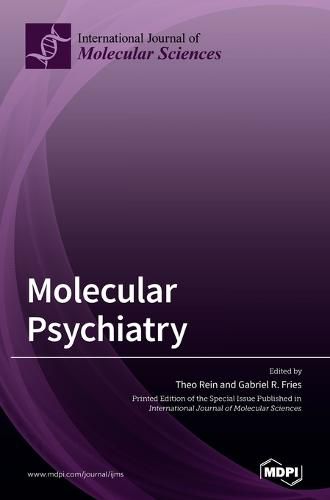Readings Newsletter
Become a Readings Member to make your shopping experience even easier.
Sign in or sign up for free!
You’re not far away from qualifying for FREE standard shipping within Australia
You’ve qualified for FREE standard shipping within Australia
The cart is loading…






This title is printed to order. This book may have been self-published. If so, we cannot guarantee the quality of the content. In the main most books will have gone through the editing process however some may not. We therefore suggest that you be aware of this before ordering this book. If in doubt check either the author or publisher’s details as we are unable to accept any returns unless they are faulty. Please contact us if you have any questions.
The book highlights important aspects of Molecular Psychiatry, including molecular mechanisms, animal models, biomarkers, advanced methods, drugs and antidepressant response, as well as genetics and epigenetics. Molecular mechanisms are a vital part of the search for the biological basis of psychiatric disorders, providing molecular hints that can later be tested as biomarkers or targets for drug development. Animal models represent a commonly used approach to aid in this bench-to-bed translation; the examples here are social defeat stress and the Roman High-Avoidance (RHA) and the Roman Low-Avoidance (RLA) rats. For biomarkers, psychiatric disorders pose a particular challenge due to the tissue specificity of many currently investigated biomarkers; i.e., not all blood-based measures directly represent changes in the brain. The Ebook includes five articles focused on the challenges of identifying clinically and biologically relevant biomarkers for psychiatric disorders.
Scientific progress typically is fostered by the development of new methods. The application of machine learning methods for the proper analysis of Big Data and induced pluripotent stem cells are examples outlined in this Ebook. Furthermore, three articles are devoted to the understanding of the mechanisms of actions of existing drugs with the ultimate goal of identifying ways to predict treatment response in patients. Finally, three articles deepen the insight into the genetics and epigenetics of psychiatric disorders.
$9.00 standard shipping within Australia
FREE standard shipping within Australia for orders over $100.00
Express & International shipping calculated at checkout
This title is printed to order. This book may have been self-published. If so, we cannot guarantee the quality of the content. In the main most books will have gone through the editing process however some may not. We therefore suggest that you be aware of this before ordering this book. If in doubt check either the author or publisher’s details as we are unable to accept any returns unless they are faulty. Please contact us if you have any questions.
The book highlights important aspects of Molecular Psychiatry, including molecular mechanisms, animal models, biomarkers, advanced methods, drugs and antidepressant response, as well as genetics and epigenetics. Molecular mechanisms are a vital part of the search for the biological basis of psychiatric disorders, providing molecular hints that can later be tested as biomarkers or targets for drug development. Animal models represent a commonly used approach to aid in this bench-to-bed translation; the examples here are social defeat stress and the Roman High-Avoidance (RHA) and the Roman Low-Avoidance (RLA) rats. For biomarkers, psychiatric disorders pose a particular challenge due to the tissue specificity of many currently investigated biomarkers; i.e., not all blood-based measures directly represent changes in the brain. The Ebook includes five articles focused on the challenges of identifying clinically and biologically relevant biomarkers for psychiatric disorders.
Scientific progress typically is fostered by the development of new methods. The application of machine learning methods for the proper analysis of Big Data and induced pluripotent stem cells are examples outlined in this Ebook. Furthermore, three articles are devoted to the understanding of the mechanisms of actions of existing drugs with the ultimate goal of identifying ways to predict treatment response in patients. Finally, three articles deepen the insight into the genetics and epigenetics of psychiatric disorders.